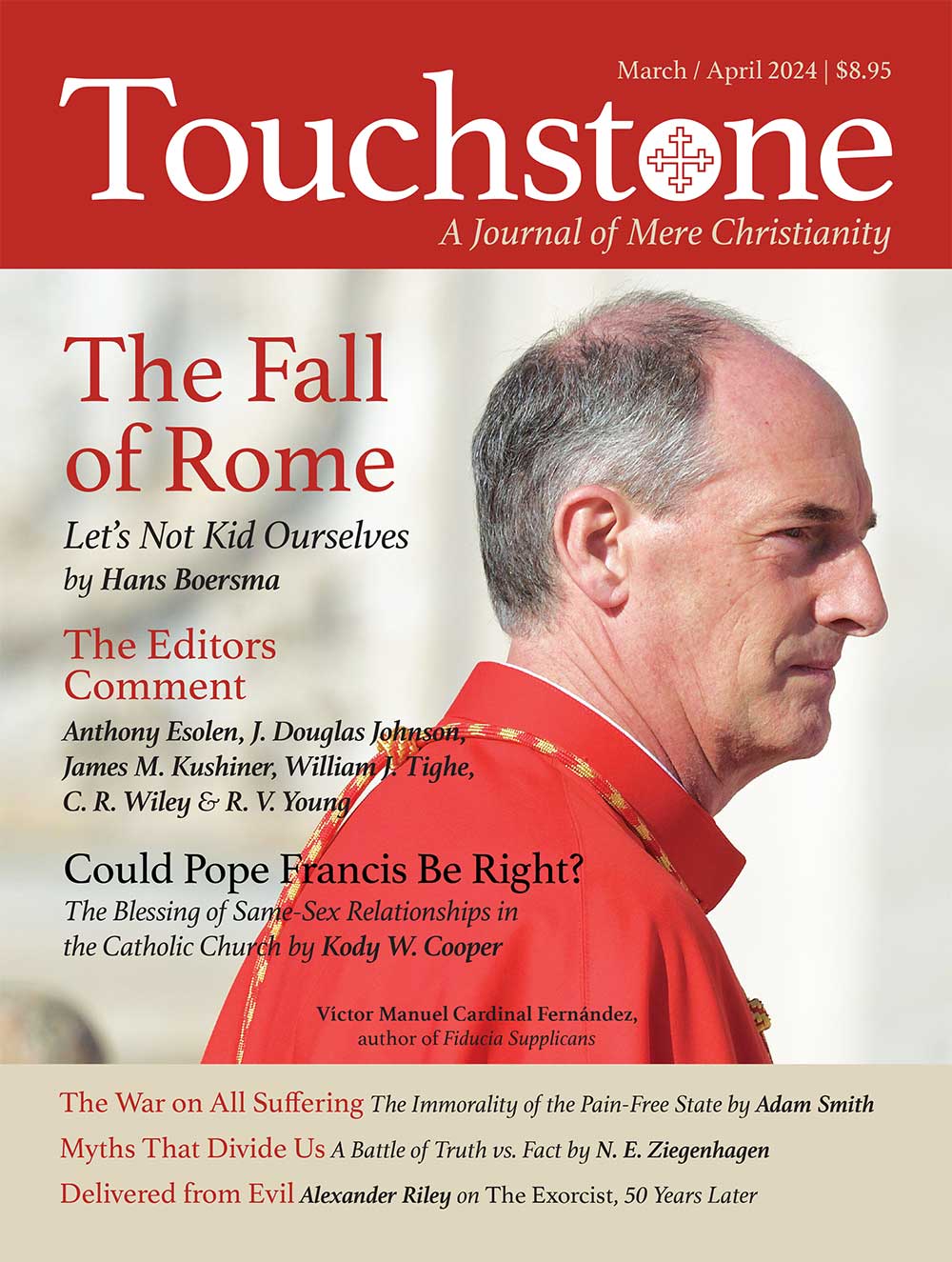The War on All Suffering
The Immorality of the Pain-Free State
In a well-known passage from A Sand County Almanac, Aldo Leopold writes about shooting a wolf:
We reached the old wolf in time to watch a fierce green fire dying in her eyes. I realized then, and have known ever since, that there was something new to me in those eyes—something known only to the mountain. I was young then, and full of trigger-itch; I thought that because fewer wolves meant more deer, that no wolves would mean hunters’ paradise. But after seeing the green fire die, I sensed that neither the wolf nor the mountain agreed with such a view.
Now, whatever wolves and mountains think, and whatever Aldo Leopold came to understand, it’s obvious that a lot of humans do agree with such a view. Plenty of people feel the trigger-itch, and not all of them have the excuse of being young. But these days it’s not usually the hunters who feel that itch to control the landscape and make it paradise. It’s those we might call “the humanitarians.”
Martha Nussbaum is one of the most influential and respected philosophers working today. In some of her recent work, she argues that, assuming we had the technical ability, we might have a moral duty to stop predators from eating other animals. This follows from her idea that one of our basic moral duties is to prevent suffering whenever we can. When the wolf kills a deer, the deer suffers, and if we can, we should stop that from happening, maybe by genetically engineering the wolf to live on grass like the deer, or by providing the wolf with lab-grown venison.
The Everyday War
Now, if you think there is an easy rebuttal to her argument, you are wrong. If you are thinking, for example, that wolves eating deer is just natural, then she will remind you that men raping women is also “natural,” or at least that this has often been how people excuse it. For her, it is not about what’s “natural.” It’s just about suffering, natural or otherwise. In her 2006 book, Frontiers of Justice, she says that “the death of a gazelle after painful torture is just as bad for the gazelle when torture is inflicted by a tiger as when it is done by a human being.”
There are many ways to rebut this claim, but this is not a philosophy paper, and Nussbaum’s argument is not my subject. It’s just an especially stark example of the first thing I want to consider, which is what Ivan Illich called “the war against all suffering.” Nussbaum is fighting this war on suffering. More than that: she’s advancing the front lines of that war deep into the hostile territory of nature. Leopold killed the wolf so the deer could live (albeit so he could then go and shoot the deer). Nussbaum also wants the deer to live, but she’s more humane. She only wants to kill the wolf’s spirit. The wolf must live, but the green fire has to die.
Readers of Touchstone may already have a good sense of what Illich is talking about, even if they have never read his work and aren’t familiar with that phrase. Nussbaum is at the front lines, where things get weird, because that’s where we philosophers like to be. But the war on suffering is very old. It’s been going on for a long time, and most people live well behind the front lines, in the world the war has built, and for them, it’s just everyday life.
The everyday war on suffering is on my mind right now because we’re just about to have our third child. I’m sure many of you have some personal experience with what’s called the “medicalization of childbirth.” I mean the unnecessary monitoring and intervention, including the pressure to induce or even to undergo a c-section. It’s the subject of sustained and intense criticism, not just in books by gadflies like Illich but in prestigious medical journals and in the recommendations of professional associations. None of that criticism has made much difference, because the medicalization of childbirth is part of the war, and to the good soldiers in the birthing suite, every intervention becomes “necessary” when there is any chance it will prevent suffering.
There are two hospitals within five minutes of our house, but my wife drives an hour away to her appointments so she can be seen by a midwife who isn’t a very good soldier, and is for that reason an excellent midwife. Unfortunately, she’s going to be away on vacation on our baby’s official due date, which means there’s a chance the baby will be delivered by a doctor instead. The midwife has already warned my wife about the pressure the doctors will likely put on her, the lectures they’ll give her for not wanting to do this or that. Which do you think we’re more anxious about—the suffering of delivery, or the war the doctor wants to wage on that suffering?
A Single Moral Rule
It’s pretty clear what I think of the war on suffering. Like Leopold, I don’t want the green fire to die. But I want all of us hopeless romantics to sit for a minute with the conviction that fuels Nussbaum’s war. Deep down, the war on suffering is fueled by the feeling that no matter how pretty it is, no matter how much poetry it inspires, maybe the green fire isn’t worth the pain. And which of us hasn’t felt the force of that feeling, at least once in our lives, if not every day?
It’s a very human feeling, and it’s not to be ignored or condemned. You’ll find it honored in the Gospels, and especially in the Book of Psalms. In fact, I think if you’ve never felt it, if you’ve never felt not just the spark of compassion but also a flicker of existential rebellion against the terms of the cosmic deal—“no meaning without suffering”—then a fire’s gone cold in your soul. And I think it’s absolutely vital to keep that flame from going out.
But the war on suffering—that is something else. Compassion and rebellion are human responses to suffering, but the war on suffering is not compassion, and it’s not rebellion. The war on suffering feeds on those human feelings like a parasite feeding on its host. It takes what is most fully human about us—our ability to suffer with other creatures, and our ability to wrestle with God—and uses those qualities to make us into something less than human.
The war on suffering follows a single moral rule: Thou shalt do what thou canst do. If you can prevent or relieve suffering, then you must. That’s the rule Nussbaum is following. And what this means is that the only limits to our obligations are technical limits. So as soon as those limits are broken, the limits to what we must do—not to what we can do if we want to—are also broken.
The war on suffering is not the desire and determination to relieve another’s suffering; it’s not a noble argument with God; and it’s more than just wishing we could change the terms of the cosmic deal and have meaning without suffering. The war is fueled not by wishful thinking but by a sense of righteous duty. When offered the choice—and this choice is the thing technology gives us—we must trade meaning for relief from suffering. If not a legal duty backed up by force (although in some cases it actually is, and this will probably become more common), it’s a perceived moral duty that imposes immense pressure on people to conform.
Increasing Visibility
Few people have put this better than Paul Kingsnorth, in his novel Alexandria. The far-future world of Alexandria is run by something like an Artificial Intelligence, called “Wayland.” Most humans have been “uploaded” into Wayland; they have left their bodies behind and ascended to the Cloud. Wayland sends “metahuman” emissaries to persuade the remaining humans to join the rest. “K,” the metahuman emissary who appears in the novel, voices the argument so perfectly, so compellingly, that the reader can’t help but feel its force. It echoes the Grand Inquisitor story in The Brothers Karamazov. Here is K’s argument:
We realize that the human body is a crime against the human mind, and a crime also against other forms of life. There is no judgement in this, and no fault. . . . I want you to appreciate the necessity of what we do. . . . Once Wayland gave us the opportunity to ethically remove the human body from the world: well, in practical terms that meant removing war from the world. It meant removing murder, rape, violence, slavery, domination, the drive for wealth, which also is the drive for power. . . . Looked at like this, wouldn’t you say that my work was a moral duty?
Alexandria is set a thousand years in the future, but Wayland’s war on suffering is as old as modernity: three or four centuries old at least, if we’re thinking about the birth of modern science with Francis Bacon in the 1600s. And no doubt it is older than that—as old as Babel, or as old as the Fall. It’s our normal world, and to most people it’s invisible, taken for granted. But I’d like to suggest that the war may have recently entered a new phase, and that what marks this phase is that it’s increasingly visible to a growing number of people. The front lines have gotten closer to home, so to speak, and far-out thought experiments like Nussbaum’s seem nearer to reality than they used to. For what it’s worth, I think this is the best way to understand the response to the pandemic, a “war on suffering” that probably would not have been thinkable even ten years earlier.
If I’m right that we’re in a new phase of the war, then the reason for it is pretty straightforward: it’s the technology, stupid! The rhetoric of technological progress is always heavy on the idea of expanding “options.” But this is a ruse, actually; technology expands technical options by foreclosing moral choices. New capacities generate new duties. Thou shalt do what thou canst do. This is the experience of the past few decades: an incredible proliferation of new capacities, always accompanied by a proliferation of technological options, and always strangely accompanied by a closure of moral choices.
The most striking example of this is probably the argument, and it is a perfectly coherent argument, that because we can block puberty, we must, in order to prevent children from suffering life in a body they did not choose to have. And the thing about this argument is that while it is just as far-out as Nussbaum’s, if not more so, it is simply the logical bleeding edge of an orthodoxy that already rules in hospitals, schools, and other institutions. It is the point of the spear plunged back into the heart of everyday life.
A War on the Meaning of the Material
I’ve spent some time on the war on suffering, and I’ve emphasized that it’s in a new phase of obviousness, because I think this is the best way to approach my subject, which is what I’m calling the politics of re-enchantment. Touchstone readers probably have a good sense of what I mean by this term, too. More broadly, I think it’s fair to say that something like re-enchantment is in the air. Rod Dreher’s forthcoming book is just one example of a larger trend.
What I want to suggest is that if there’s a growing desire for re-enchantment, it’s a direct response to this accelerated war on suffering, and we have to see that clearly if it’s going to be a good response—because part of what I want to say here is that the politics of re-enchantment can go bad pretty easily. But put that aside for now: the logic that makes the one a response to the other is pretty simple, yet it’s worth laying out.
The desire for re-enchantment, as I’m calling it, is a desire for meaning in the wake of its loss to the war on suffering. And it is specifically a desire to recover the meaning of the material world, and in particular the human body.
The war on suffering is a rejection of the terms of the cosmic deal; the good soldiers in the war would force us to trade meaning for relief from suffering. Meaning is what the war on suffering destroys. Of course, the trade doesn’t actually work; we do not get relief from suffering. We just get the other kind of suffering that comes from meaninglessness, which is much worse, as is evidenced by the fact that people faced with meaninglessness seek pain as an antidote. Johnny Cash (covering a song by Nine Inch Nails) sings: “I hurt myself today, to see if I still feel; I focus on the pain, the only thing that’s real.”
The war on suffering is a war on the meaning of the material world in general, and the meaning of the human body in particular. That’s what Kingsnorth is talking about in that passage from Alexandria. Carl Trueman says correctly that the question of our time is the question of anthropology, and that “the status of the body as it relates to us as human persons seems to be the issue that lies, often unseen, behind many of the other more prominent debates of our age.” Wendell Berry asks, “What are people for?” and it is the right question. But people have bodies, and the form the question now increasingly takes is, “What are bodies for”?
The war on suffering, fueled by a sense of righteous duty, is a war against physical, material, bodily reality. This is inevitable, because suffering comes from bodily reality. Within the terms of the cosmic deal, the fact that we have bodies, which are things that can suffer, is the fact that makes our lives meaningful. It is physical, material, bodily reality that has meaning. The green fire is not “out there,” floating in the air, nothing but a metaphor. The green fire is there in the wolf’s eye. It burns in that blob of jelly and nerve in the hollow of its skull, or it doesn’t burn at all.
So you can see why the newly obvious war on suffering, as a war on the physical, embodied world, which is the world of meaning, might provoke a new desire for re-enchantment, a deeper longing for lost meaning, for the old green fire. And you can see why those who are moved by this desire—and I count myself among them—might talk so much about the importance of the physical, of the material, of nature, human and otherwise, of what Matthew Crawford calls “the world outside your head.” Our motto might well be, “Make matter matter again.”
But with that little echo of a political slogan, I want to turn to my real subject, which is not “re-enchantment” per se but the politics of re-enchantment, the politics of the search for meaning. This is a politics of opposition to the war on suffering, a politics of resistance (although that’s a word I use advisedly, since pretty much everyone these days thinks he’s part of la resistance, stylishly fighting Nazis). Now, one thing you might notice about this resistance is that it seems to show up in a lot of different forms that don’t always seem compatible. For example, it seems that some of the most energetic opposition to the new gender theory comes from American and Canadian Muslims, who used to be defended by the progressives, who are now pushing the gender theory against the Christians, who used to be afraid of Muslims and now find themselves marching with the Muslims against the progressives.
On one level, this kind of tension or contradiction is just normal politics, which traditionally makes for strange bedfellows. Alliances are always temporary; the enemy of my enemy is my friend; and so on. But I think there’s another, more basic tension that relates directly to the logic of the war on suffering, and it might be useful to tease it out.
A World Reduced to Flatness
The world that the war on suffering leaves in its wake is characterized above all by what David Samuels, in an essay titled “The Happiest Place on Earth,” calls “flatness.” Go back to Nussbaum’s argument about the wolf and the deer. The obvious response to Nussbaum is that the wolf’s nature is to kill the deer, and that our properly human nature—not what’s instinctive, but what’s proper to us—is not to torture and rape and such. The fire in the wolf’s eye is wolfish fire: “Tyger, tyger, burning bright / In the forests of the night.” The fire in the human eye is human fire, a more complex thing, to be sure. We have the wolf in us, but we are not wolves. We simply have different natures; we are different kinds of creatures.
What Nussbaum does is to reduce everything to the question, “Can it suffer?” But all creatures, presumably, can suffer. The effect of this morally seductive question, the effect of the war on suffering, is to flatten all the distinctions between kinds, and thus all distinctions between kinds of suffering. It is strange to suggest that the suffering of a deer being eaten is the same kind of thing as the suffering of a woman being raped, or more precisely, that while they are different, the difference is not morally significant, in terms of what we ought to do about it.
Not morally significant enough to prevent us from concluding from her argument, for example, that if men are naturally disposed to violence against women, then their bodies should also be “modified” to prevent that violence, or perhaps, alternatively, that they should be given sex robots so they can vent their lusts harmlessly, just like the wolf should be given lab-grown meat. I need not even mention here the “flattening” of the sexes, which we ought to understand is not a denial of the bodily differences between male and female, but rather a denial that those bodily differences matter. Eventually it will be insisted that, if they come to matter to us without our consent, then they must be forced to “not matter,” forced into insignificance by being made the object of a choice rather than the receipt of a gift, as in the idea of default puberty blocking. Because in this kind of moral calculus, all gifts are curses, sources of suffering.
So this is flatness: any distinction, any real material difference that gives structure and form to experience, that gives it depth and height, width and breadth, must be flattened. As Samuels puts it, “flatness is a religion, which . . . means a pattern of surveillance and social control that leaves no part of society untouched.”
But what I want to emphasize about flatness—and this will bring us back to the politics of re-enchantment—is that the flat world is experienced by us malcontents as simultaneously a world of anarchy and a world of tyranny. The metaphor makes good sense of this: it is anarchic because the limits that bring meaning, like the boundaries between wolf and man, or between man and woman, are flat. No one is in charge, and nothing is better than anything else, because everyone and everything is the same: everything is reduced to its materiality, which, when it is divorced from meaning, is all interchangeable, a world of atoms bouncing in the void. But of course, it takes a lot of force to flatten reality like this. And that is why the flat world can also feel like a tyranny. The war on suffering is a steamroller.
Practices vs. Institutions
So it’s no surprise if the politics of re-enchantment, the resistance to Flat World, seems to comprise an odd alliance between people who might call themselves “conservatives” and people who might call themselves libertarians or even “radicals.” The conservatives see the anarchy and look for lost meaning in order; the radicals see the tyranny and look for the lost meaning in liberty. The radicals look at the conservatives’ “order” and see more tyranny, while the conservatives look at the radicals’ “liberty” and see more anarchy. While there are ways to synthesize these positions conceptually (“ordered liberty”), I think there’s a simpler and also more useful explanation for the alliance. It’s about who’s driving the steamroller.
The thing to see about Flat World is that it is built not by citizens wielding political power but by institutions that are anti-political to their core. Here we ought to think about Alasdair MacIntyre’s distinction between institutions and practices. A practice is, for example, running marathons. It’s a human activity that aims at a goal and is shaped by that goal, which limits what the activity can and can’t be. An institution is made to house a practice, to make it possible. It’s a set of rules or, to be more precise, incentives. You could run 26.2 miles without entering an organized race. We organize races, with rules and specifically with prizes, to encourage the practice.
But the key thing about institutions is that they can also destroy practices. By offering a prize for winning the race, the institution makes cheating a possibility; you could get in a car, drive to the finish line, and win, all without engaging in the practice of running. So institutions are supposed to make practices possible, but they can also make practices impossible. If everybody starts cheating, we’ll forget how to run.
It’s the institution of medicine, not the practice of medicine, that medicalizes childbirth and flattens gender in the name of the war on suffering. It’s institutions that wage the war on meaning, not least because meaning comes from limits, limits to what we should do when it turns out we can do it. Those are limits to what an institution should do to expand its power, for institutions divorced from practices exist for the sake of their own growth—like cancer.
So this is why there’s a radical side and a conservative side to the politics of re-enchantment, to the search for lost meaning in the material world. The radical sees the tyranny, not of “power” in the abstract, and not even of political power, but of practice-free institutions in particular, and the liberty he wants is freedom from those institutions, from the moral pressure they use to flatten meaning in their war on suffering. It’s why my wife drives an hour away to a hospital that isn’t quite so divorced from the practice of medicine. The conservative sees anarchy, but it’s not the anarchy that comes from the absence of organized political power; it’s the anarchy that comes from the exercise of institutional power, from the steamrolling moral pressure they put on our souls. The radical and the conservative—at least the ones I have in mind—are talking about the same thing. To paraphrase myself from earlier: it’s the institutions, stupid! Of course, institutions are themselves a kind of technology, as Ivan Illich knew.
Resisting Institutions
The war on suffering is waged by institutions. It’s institutions that flatten the meaning of the material world, the world of the body in particular. The woman in the birthing suite is not a particular female human body, but is rather an assemblage of parts: that’s why she must be induced. The boy struggling with his identity is not a particular male human body, but rather a collection of preferences, none better than any other, distinguishable only by which one prevails at the moment: that is why he must be transitioned.
And so the politics of re-enchantment, as a search for this lost meaning of the material world, of the body, is a politics of resistance to institutions specifically—to any institution that is supposed to house a practice but which has devoured that practice and survives now by pretending it still exists to heal, to educate, to produce goods, to govern, to connect people to God, and is still limited by that purpose.
It is doubly useful to see the politics of re-enchantment in light of the difference between institutions and practices because re-enchantment is a search for the lost meaning of the material world, and this is exactly what a “practice” is: practices are how we make contact with a meaningful reality. Shopcraft is soulcraft, as Crawford put it.
It’s not only useful but vital, because the obvious danger of a politics of “re-enchantment” is that it will be exactly the opposite: an anti-politics of escape from meaningless reality, an escape into our heads, as opposed to an effort to get into the world outside our heads. This is probably the first thing most people would think about if they heard the word “re-enchantment.” They’d think about the sad sacks who are just dabbling in fantasies; they’d think about the people who spend a lot of time complaining about “the emptiness of the modern world” and think they’re going to feel less empty if they dress up like a medieval warrior on the weekends. They’d think about people who are high on their own supply, people who are trying desperately to make their own story come true.
And they’d be right to think about this, because there’s plenty of it going around. But I’d like to suggest that “trying desperately to make your own story come true” is exactly what the war on suffering encourages us to do. It may be the only thing that war leaves us capable of doing. Nothing is more superstitious than the idea that you can evade suffering by using technology to escape the meaning of your body. “Make your story come true” is the slogan of the gender clinic.
Small Politics, Cosmic Significance
Now, I have been talking at some length about the politics of re-enchantment, and somehow I’ve yet to mention God. I’ve been talking about the material world, the bodily world, the world of nature—what about the supernatural? Is the green fire really all in the wolf’s eye? I must admit that some of my interest in this question comes from my own recent experience of being “re-enchanted”: a kind of reconversion to the simpler faith of my youth. And I know others in my circle who have experienced something similar. Maybe this is one reason it feels to me like “something is in the air.”
But let me just say this: The everyday work of re-enchantment is the rediscovery not of “meaning” in the abstract but of practices that put us in contact with meaningful reality by putting us in touch with our limits. And I think this focus on humble, everyday practices is the right way to point to a God that transcends the material world. But it’s not the God that “makes America great again.” It is not the God of Big Things. That’s the trigger-itch again. I agree with Heidegger: only a god can save us now. But our salvation will come from the God of small things. I think we re-enchant the world, not with grand plans, but with one small thing at a time.
So I’ll conclude by suggesting that the politics of re-enchantment, if it’s going to be a good and not a bad response to the war on suffering, has to be a small politics, a local politics. But if that thought brings us down to earth, it also invests the idea of “localism” with its full cosmic significance. “Localism” isn’t just a strategy of governance or an escape into the bush or a sop to our nostalgia for the good old days. Localism is how we Make Matter Matter Again. It’s how we kindle and tend that fierce green fire.
Adam Smith is Associate Professor of Political Philosophy and Director of the Honors Program at the University of Dubuque. He also serves as Associate Editor for Front Porch Republic.
subscription options
Order
Print/Online Subscription

Get six issues (one year) of Touchstone PLUS full online access including pdf downloads for only $39.95. That's only $3.34 per month!
Order
Online Only
Subscription

Get a one-year full-access subscription to the Touchstone online archives for only $19.95. That's only $1.66 per month!
bulk subscriptions
Order Touchstone subscriptions in bulk and save $10 per sub! Each subscription includes 6 issues of Touchstone plus full online access to touchstonemag.com—including archives, videos, and pdf downloads of recent issues for only $29.95 each! Great for churches or study groups.
Transactions will be processed on a secure server.
more from the online archives
calling all readers
Please Donate
"There are magazines worth reading but few worth saving . . . Touchstone is just such a magazine."
—Alice von Hildebrand
"Here we do not concede one square millimeter of territory to falsehood, folly, contemporary sentimentality, or fashion. We speak the truth, and let God be our judge. . . . Touchstone is the one committedly Christian conservative journal."
—Anthony Esolen, Touchstone senior editor










